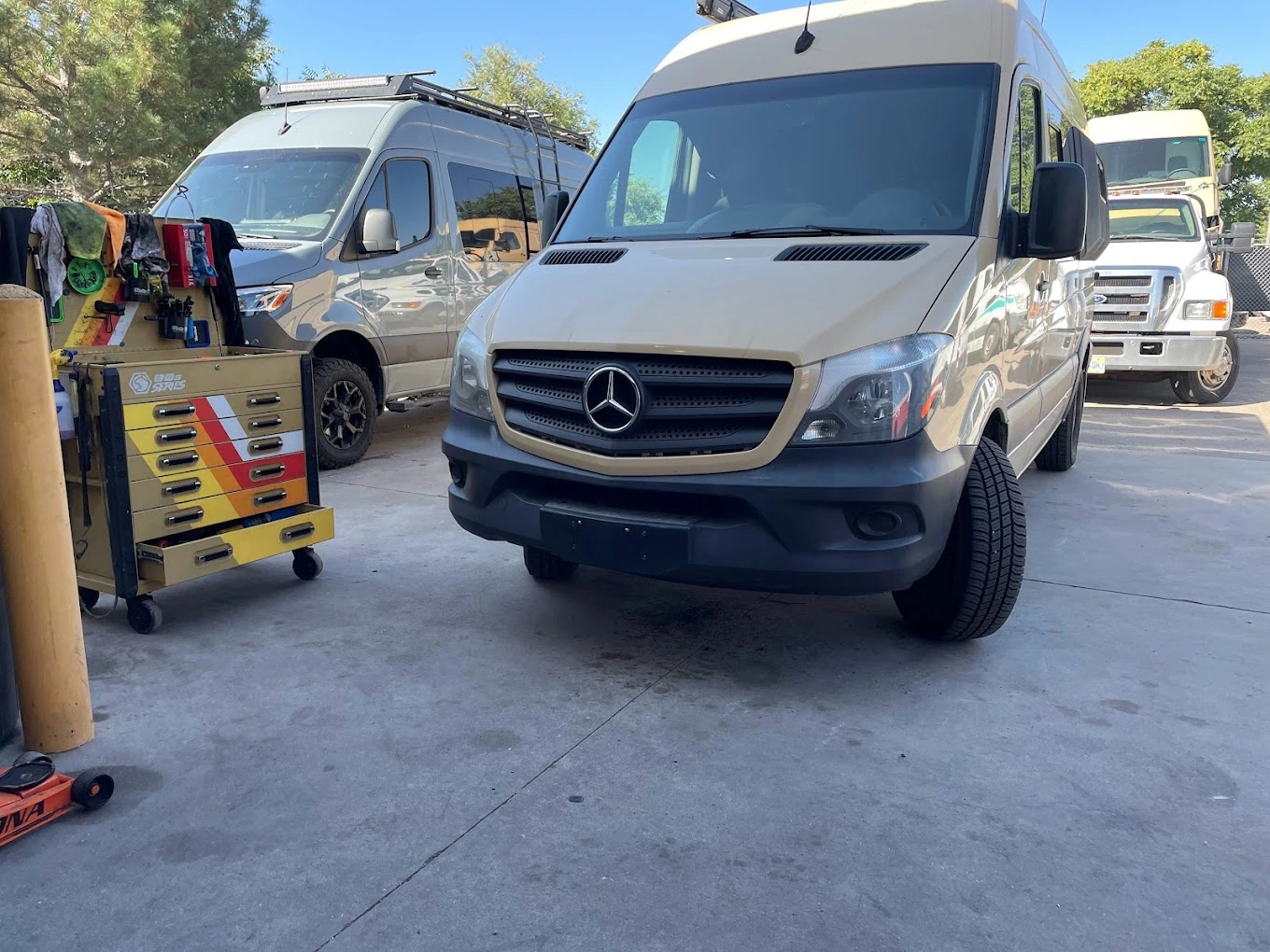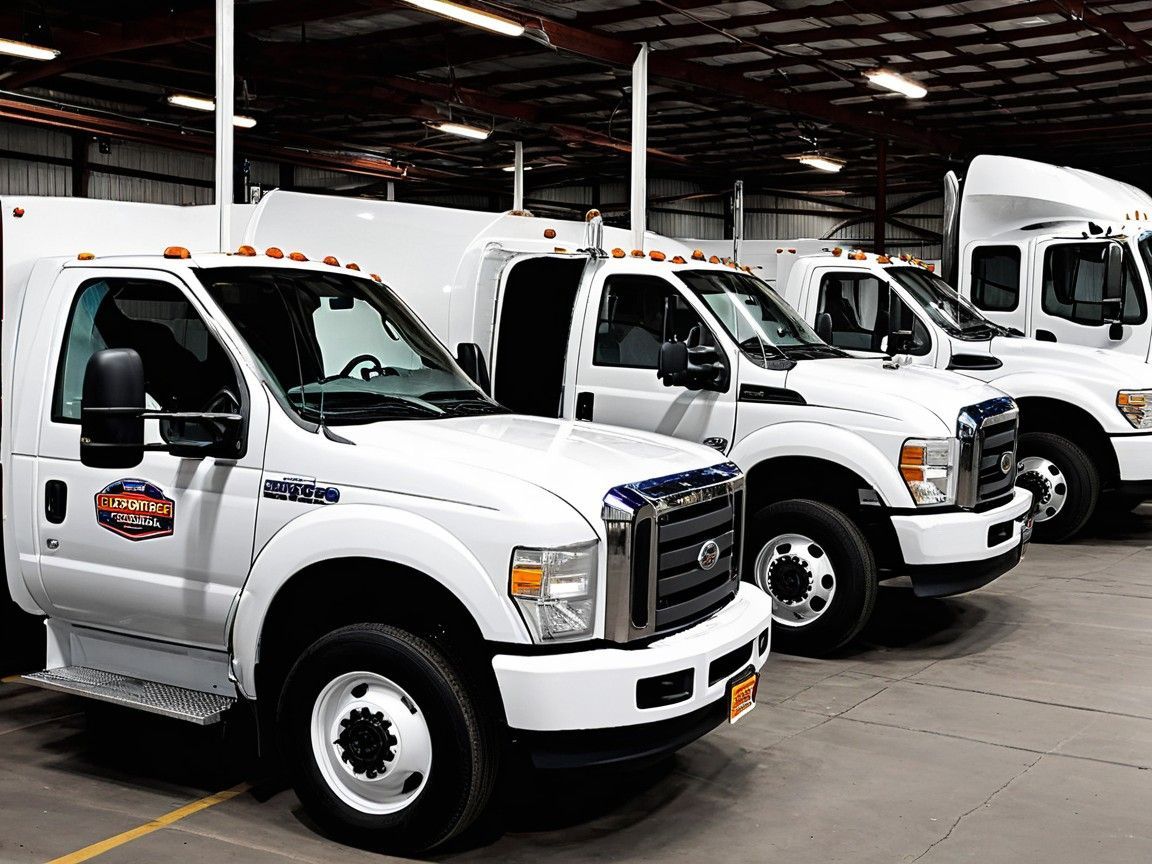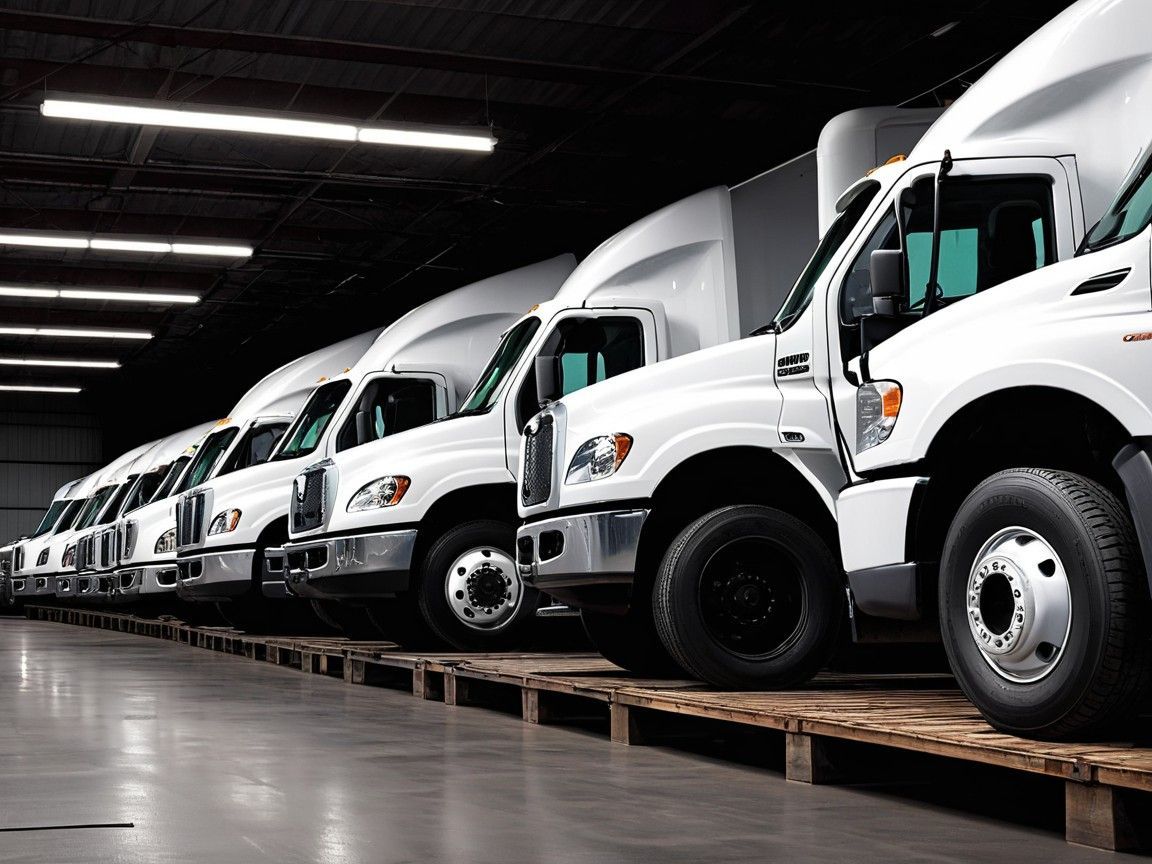Colorado Fleetworks Blog
Get shop updates and learn new information about the vehicles we specialize in repairing.
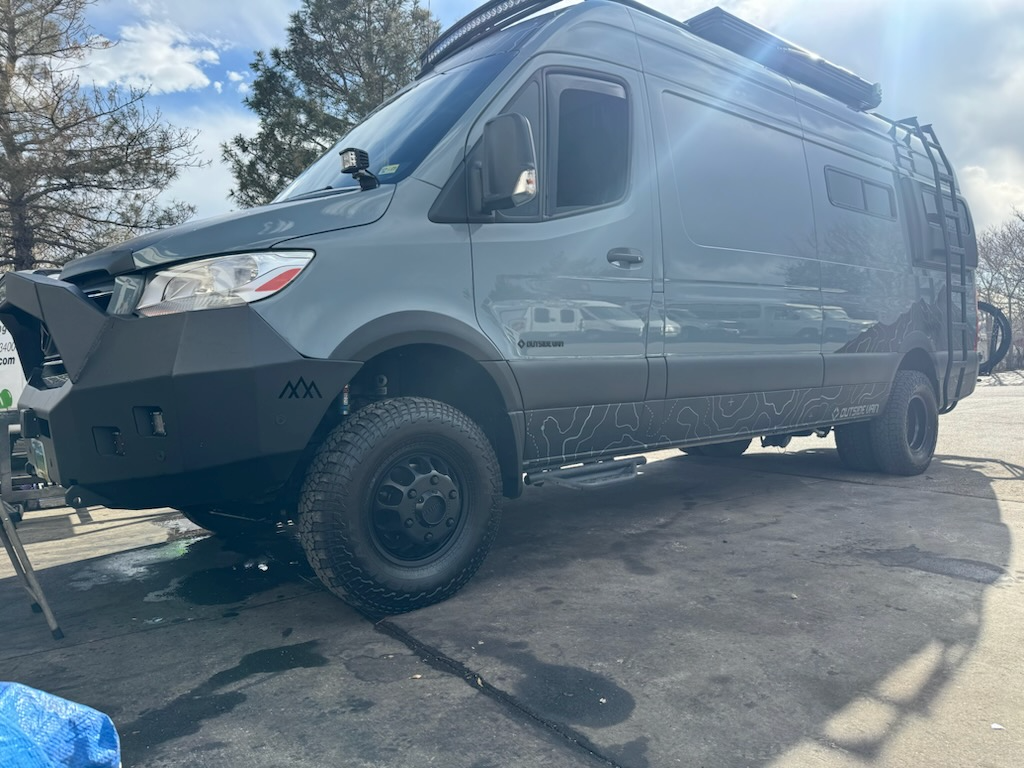
If you're thinking about buying a Mercedes or already own one, it's normal to wonder how long it will actually last. We hear this question all the time. The short answer? If you keep up with maintenance, most Mercedes-Benz vehicles will run strong for 200,000 to 250,000 miles. Some of models like the E-Class and S-Class can even hit 300,000 or more. Of course, how long your car lasts depends on things like how you drive it, how often it’s serviced, and which model you’ve got. But if you treat it right, a Mercedes can easily go the distance. Mercedes Vehicles Are Built to Last Mercedes puts a lot of engineering into their vehicles. You get solid drivetrains, high-quality components, and well-designed systems. But even a great vehicle can wear out early if it's not cared for. If you stay on top of oil changes, fluid services, and repairs when they first show up, your Mercedes has a real shot at lasting longer than most cars on the road. Some people run into issues because they wait too long between services or skip them altogether. Ignoring things like coolant leaks, check engine lights, or transmission problems might save you money in the short term, but it usually leads to bigger repairs later on. Gas vs Diesel Longevity Most Mercedes owners are driving gas-powered models, but diesel engines are known for lasting even longer with the right upkeep. If you're running a diesel, just know there are extra systems to watch, like the DPF and DEF systems. If those go unchecked, repairs can get pricey. But with regular inspections and the right service schedule, both gas and diesel Mercedes vehicles can stick around for a long time. Service Makes a Difference One of the biggest things that impacts the life of any Mercedes is where you take it for service. Not all shops know how to work on these vehicles properly. At Colorado Fleetworks in Denver, we work on Mercedes-Benz vehicles all the time and understand how to keep them running at their best. We do everything from regular maintenance to complex diagnostics and engine work. Whether your vehicle is still under warranty or well into its high-mileage years, we can help you avoid the common problems that shorten a car’s life. If you’re wondering whether your Mercedes can make it to 300,000 miles, the answer is yes. But it’s not automatic. Staying ahead of problems, following a maintenance schedule, and working with a shop that knows what it’s doing will make all the difference. Need help keeping your Mercedes on the road? Get in touch with us . We’re here to help you get the most out of your vehicle, mile after mile.
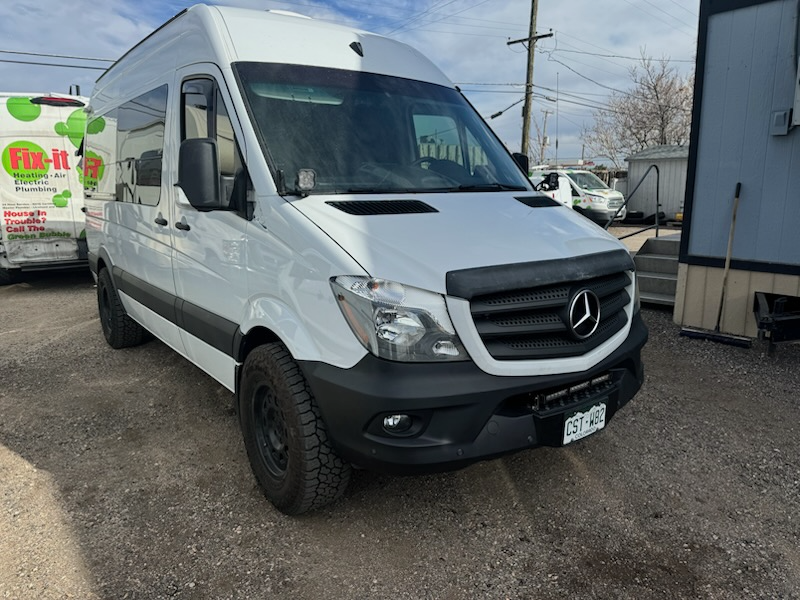
What’s the Most Reliable Cargo Van? We get this question a lot, especially from small business owners and fleet managers who need vans that just work. No surprises. No constant trips to the shop. Just something that holds up over time and can take a beating without falling apart. Here’s what we’ve seen, working on vans every day in our shop in Denver. Ford Transit: A Solid All-Around Choice The Ford Transit has become one of the most popular cargo vans on the road, and for good reason. Parts are easy to find, it’s relatively simple to work on, and they tend to hold up well if you stick to the maintenance schedule. The drivetrain options are reliable, and the newer models with the EcoBoost engine are surprisingly strong. We work on a lot of high-mileage Transits that are still going strong. Just make sure you stay ahead on oil changes, brakes, and regular inspections. The front suspension can wear early on some models, but nothing too major if caught in time. Mercedes-Benz Sprinter: Built to Last, If You Keep Up With It Mercedes vehicles are known for quality, and the Sprinter is no exception. We’ve worked on Sprinters that are well past 300,000 miles and still going. That said, the key here is consistent maintenance. Sprinters are more complex than other vans, especially on the diesel side. Things like DEF and DPF systems need attention, and the parts can get expensive if neglected. If you’re staying on top of service and taking it to a shop that knows Sprinters inside and out, it’s a van that can definitely go the distance. If you’re not, it can get expensive fast. Looking for Sprinter help? We handle Sprinter repair and service and know what to look for before small problems turn big. Ram ProMaster: Reliable in a Simpler Way Of course, we service and repair Ram Promaster vans as well . The ProMaster might not have the prestige of a Sprinter or the overall popularity of the Transit, but it’s reliable in its own right. The front-wheel drive setup is simple and has fewer parts to go wrong. The 3.6L Pentastar engine used in most models has been around for years and is known to last. The build quality is more basic, but that’s not necessarily a bad thing. Fewer electronics and complicated systems can mean fewer repair bills. For certain types of fleets or businesses that just need a van to get from point A to B, the ProMaster is a solid option. All three are capable, reliable vans when treated right. The best one for you depends on how you use it, how often you maintain it, and what kind of repairs you’re prepared to handle. Need help keeping yours on the road? We’re here for that. Give us a shout at Colorado Fleetworks and we’ll keep your van running like it should.

Wondering how often you should change the oil in your Sprinter? If you drive a diesel MB Sprinter van, you already know it’s built to work hard. But like anything that runs long miles, it needs regular care to stay in good shape. One of the biggest maintenance items? Oil changes. For most diesel Mercedes Sprinter diesels, it’s a good idea to change the oil and filter every 10,000 miles or once a year, whichever comes first. If you’re doing a lot of stop-and-go driving, towing heavy loads, or spending time in extreme temperatures, it’s smart to do it a little more often. Those kinds of conditions can wear the oil out faster, so staying on top of it can help avoid bigger problems down the road. At Colorado Fleetworks, we service and repair Sprinter vans in our Denver shop to the tune of dozens every week. We’ve seen what happens when oil changes are done on time, and we’ve seen what happens when they’re not. The Short Answer For most Mercedes Sprinter diesel engines, the recommended oil change interval is about 10,000 miles or once a year , whichever comes first. That’s assuming you’re using the correct synthetic oil and OEM filters. If your Sprinter is part of a fleet, gets heavy daily use, or spends a lot of time idling, you might want to change it closer to every 7,500 miles to stay ahead of wear. Why Oil Changes Matter More Than You Think Sprinter diesel engines are tough, but they run hot and work hard. Over time, oil breaks down and collects gunk from combustion. If you push your oil past its limit, it can lead to things like sludge buildup, reduced fuel efficiency, or even early engine wear. Clean oil keeps everything moving the way it should and helps your engine last a lot longer. Don’t Forget the Filter We always recommend swapping out the oil filter with every change. Dirty filters can’t do their job, and keeping them fresh ensures that contaminants don’t cycle back through your engine. It’s a simple step that can prevent expensive problems later on. Signs You Might Be Overdue If you’ve gone too long between changes, you might notice sluggish performance, engine noise, or reduced fuel economy. Some Sprinters will even throw a warning light when it’s time. But you don’t need to wait for a signal. Regular oil service is cheap insurance compared to what engine repairs cost. Book Your Oil Change with Sprinter Experts We’ve been working on Sprinters in the Denver area since 2015. Whether it’s a routine oil change or a full inspection, we can help you get the most life out of your van. If it’s been a while or you’re not sure when your last service was, stop by and we’ll take care of it. You keep the van moving. We’ll help keep it running right.
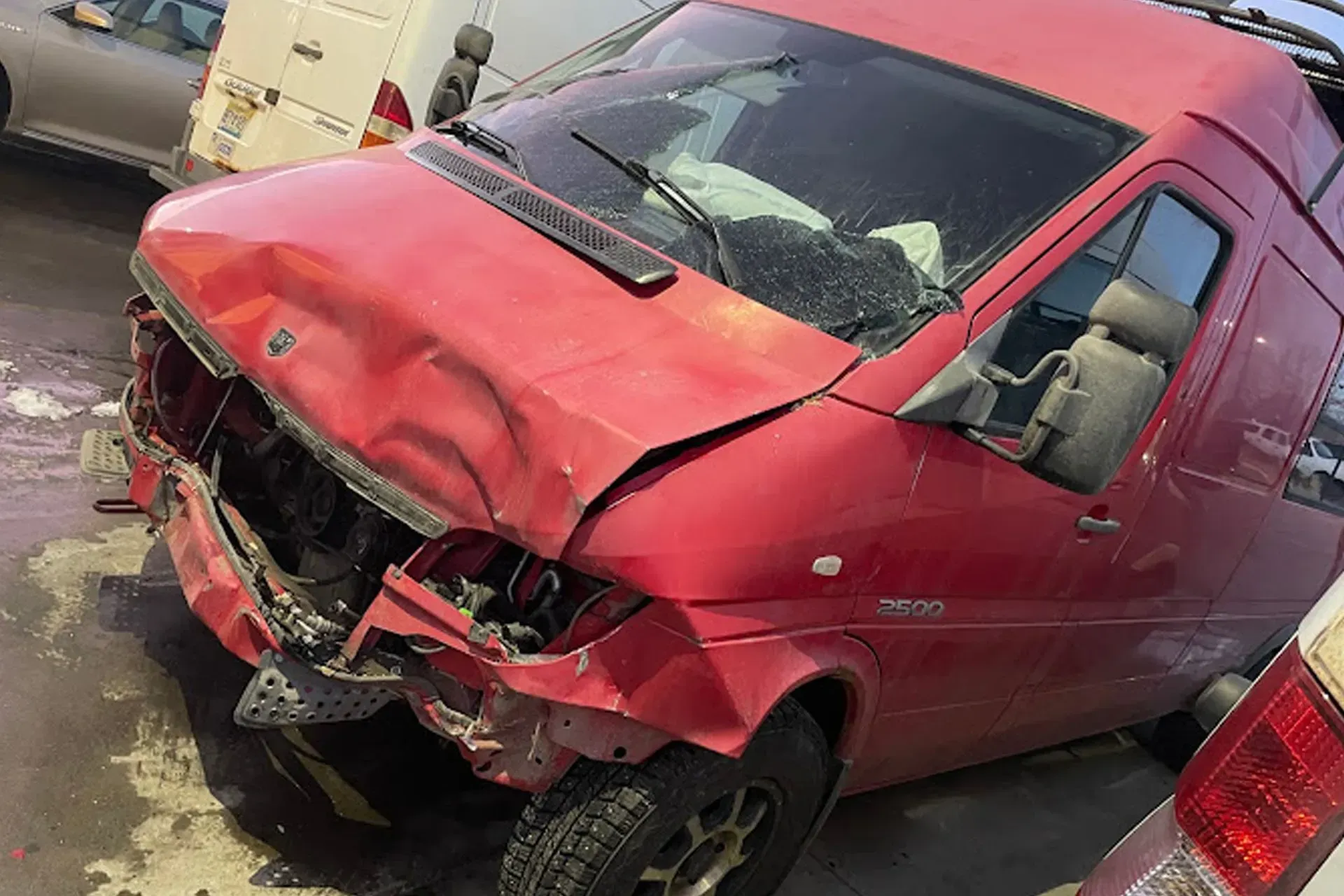
If you've got a cargo van, camper van, or fleet vehicle that needs body work, you already know it’s not exactly fitting into your average garage. These things are tall. And wide. And long. And most body shops just aren’t set up to handle that. That’s where having a shop with large bays and tall paint booths makes all the difference. Size Matters (A Lot) Standard auto body shops are built for regular passenger vehicles. But when you roll in with a high-roof Sprinter or an extended Ford Transit, suddenly the game changes. Without extra-tall ceilings and oversized paint booths, a shop simply can’t get your van inside, let alone repaired and painted properly. You can’t exactly buff out a dent on a roof you can’t reach. At Colorado Fleetworks, we’ve got two of the tallest paint booths in the Denver metro area, and bays built to handle high-roof vans and larger fleet vehicles. That means we can take care of everything from basic fender repair to full panel replacements and full-body paint jobs, no weird workarounds or sketchy corner cutting. Vans Have More Going On The other thing with van body repair is that it’s rarely as simple as “pop off the bumper and replace it.” If your van’s a camper, you might have cabinets, plumbing, wiring, or custom panels in the way. If it’s a work van, you’ve probably got shelving, racks, or tool systems built in. A shop that knows vans understands how to remove interior components without destroying your setup. We know how to get the job done while protecting the stuff you’ve built around it. Paint Jobs That Actually Work Painting a van isn’t just about matching color. It’s about space. You need the kind of airflow, ventilation, and vertical clearance that a shop with oversized booths can provide. Trying to spray a tall van in a short booth is a no-go. You’ll get overspray, inconsistent coats, or worse, a job that peels or fades in a few months. With our equipment, we can get that even, factory-quality finish no matter the size of your van. Bottom Line If you’ve got a van that needs body work , don’t waste your time at a shop that isn’t built for it. Find a place that actually has the right equipment, knows how to work with large vehicles, and respects the setups inside them. At Colorado Fleetworks, we’re set up to handle everything from Transit Connects to high-roof Sprinters , and we do it every day. If your van needs body work in the Denver area, we’re ready when you are.

Replacing the engine in your Mercedes Sprinter isn’t anyone’s idea of fun, but if you’re her asking "How much does a Sprinter engine replacement really cost?," you might be staring that reality in the face. Whether you're running deliveries every day, living full-time in your van, or just trying to keep your work fleet on the road, a blown engine is a big deal. And yes, it can be a big price tag too. So… what’s the damage? Let’s get to the part everyone wants to know. On average, a full engine replacement for a Sprinter can run anywhere from $10,000 to $20,000. That’s a wide range, but there’s a reason for it. It depends on: The year and model of your Sprinter Whether you go with a brand-new engine, a remanufactured one, or a used swap Labor costs, which vary depending on where you take it How much additional work is needed once the engine’s out For example, if the turbo is cooked or you’ve got other damage tied to the failure, that could bump up your costs. Why labor costs are a big factor Sprinters aren’t like your typical pickup or sedan. Everything’s packed in tight under the hood, and getting to the engine takes time. There’s also a whole lot of sensors, electronics, and van-specific parts to reconnect after the new engine is in. It’s a time-consuming job that really needs a tech who knows these vans. New vs. remanufactured vs. used Sprinter engines A brand-new engine from Mercedes is the most expensive route, and not always necessary. Many folks opt for a remanufactured engine, which has been rebuilt with new internal components and tested. It's usually more affordable and still super reliable when sourced right. Some go the*used engine route, but it’s riskier unless you really know the history. Should you replace or repair? Not every engine issue means full replacement. If the bottom end’s still solid and you’ve just got a cracked head or blown gasket, repairs could be more cost-effective. But if your Sprinter’s racked up a ton of miles and it’s one thing after another, a full swap might actually save money long-term. Trust a Sprinter expert, not just any mechanic We’ve said it before, and it definitely applies here: not every shop is set up to handle Sprinters the right way. You need someone who understands these vans inside and out. At Colorado Fleetworks, we work on Sprinters every single day , including work vans, camper builds, delivery vehicles, you name it. We’ve done our fair share of engine replacements, and we’re honest about what makes sense and what doesn’t. If you’re facing a possible engine replacement, we can walk you through the options, take a real look at what’s going on, and help you make the call that’s right for your van and your budget. Need help with your Sprinter's engine? Reach out to Colorado Fleetworks in Denver . We know vans, and we’re here to keep you moving.
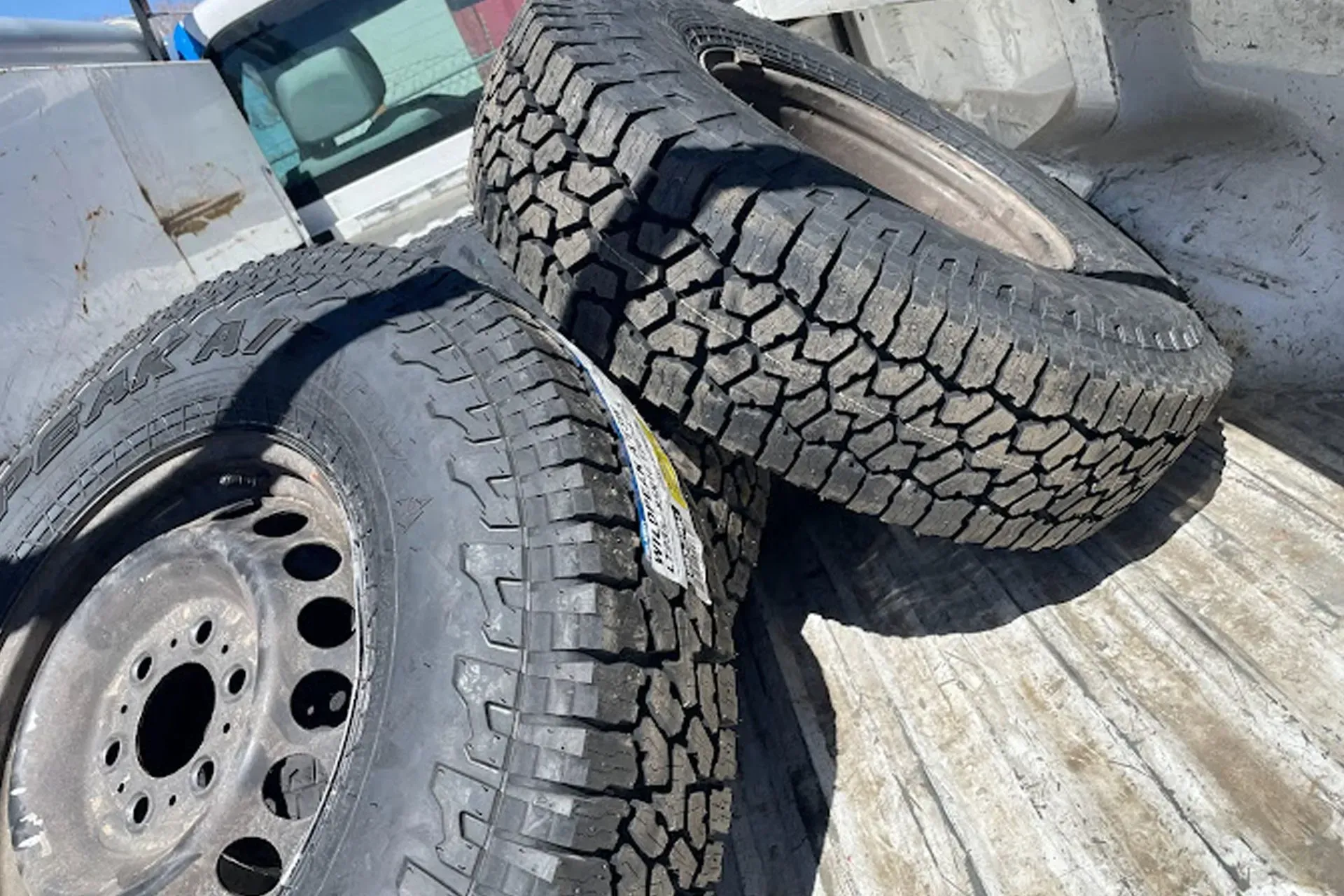
Winter driving in Colorado isn’t for the faint of heart. One day, the roads are dry and clear, and then overnight, you’re waking up to black ice and a foot of snow. If you’re still running all-season tires, you might be rolling the dice more than you realize. Here’s why winter tires are a game changer for safety and control when the temperatures drop. What Makes Winter Tires Different? Winter tires aren’t just about tread patterns - they’re made from a different type of rubber that stays flexible in the cold. Regular all-season tires harden in low temperatures, reducing grip, while winter tires keep their traction even in freezing conditions. Plus, their deep grooves and biting edges are designed to cut through snow and slush, helping you stay in control. Do You Need Winter Tires in Colorado? Short answer: Yes, if you want to drive safely in snow and ice and don't have other traction devices. Colorado’s winter roads can be unpredictable, and while all-wheel drive helps with acceleration, it won’t help you stop faster. Instead, your tires do that. If you drive in the mountains, winter tires can make the difference between getting up a pass or sliding backward. Even in the city, icy intersections and surprise snowstorms mean having the right tires could prevent an accident. The Colorado Traction Law If you’re driving in the mountains from September to May, you might already know about Colorado’s traction laws. When these go into effect, vehicles must have proper tires with at least 3/16" tread, snow chains, or a four-wheel/all-wheel drive system. You can view all of the up-to-date requirements here . Winter tires (or all-terrain tires with the right tread depth) make it easier to comply with these laws while also keeping you safer on the road. When to Switch to Winter Tires The best time to put on winter tires is before the first big freeze, typically around October or early November. A good rule of thumb? When temperatures consistently drop below 45°F, it’s time to swap them on. Once spring hits and the weather warms up, switch back to all-season or summer tires to prevent unnecessary wear on the softer winter rubber. Need Help Getting Winter-Ready? At Colorado Fleetworks, we know how important it is to keep your vehicle safe and reliable all year long. If you need winter tires installed or aren’t sure if your current ones are up to the challenge, we’re here to help. Swing by, and we’ll make sure you’re set up for whatever Colorado’s winter throws at you!
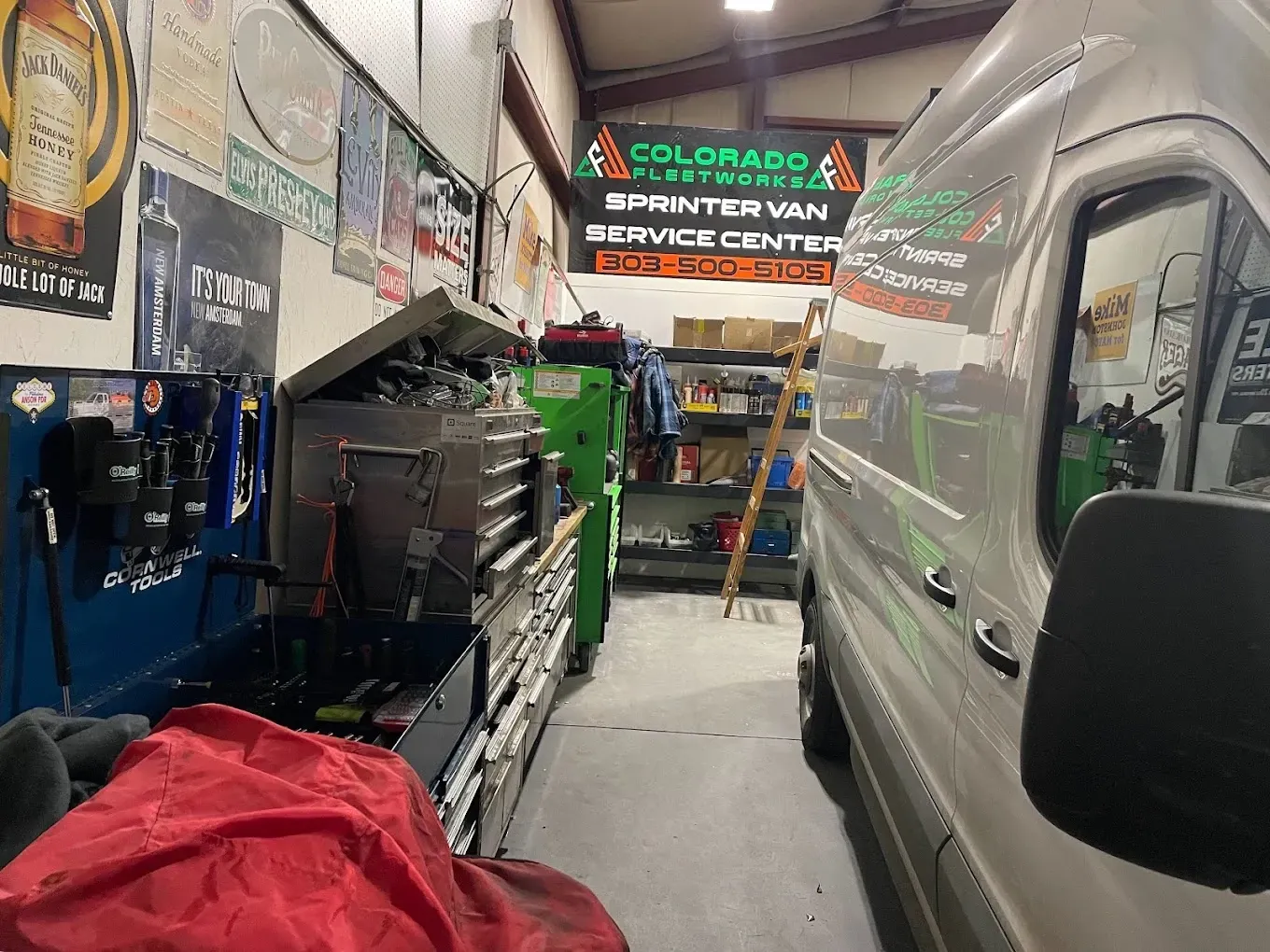
Winter is tough on vehicles, and the last thing you want is to deal with a dead battery or sliding around on icy roads. A little maintenance now can save you a lot of hassle when temperatures drop. Here’s what to focus on before winter really sets in. Check Your Tires Tires are your first line of defense against winter roads, so make sure they’re in good shape. Check the tread depth—if it’s worn down, you might need new ones. If you live somewhere with heavy snow and ice, winter tires are a smart investment since they provide better traction. Also, colder temperatures cause tire pressure to drop, so check it regularly and keep it at the recommended PSI. Test Your Battery Cold weather drains car batteries faster, and if yours is already weak, it might not have enough power to start your vehicle. If your battery is more than three years old, get it tested before winter hits. Also, check for corrosion on the terminals, since buildup can interfere with the connection. If you notice slow starts or dimming headlights, it might be time for a replacement. Keep Up with Oil Changes Winter temperatures make oil thicker, which can strain your engine. Check your owner’s manual to see if your car requires a different oil viscosity in cold weather. If you’re due for an oil change, don’t put it off—clean oil helps your engine run smoother, especially in freezing conditions. Inspect Your Brakes Slippery roads mean your brakes need to be in top shape. If you’ve noticed any squeaking, grinding, or a spongy brake pedal, get them checked out. Worn brake pads can reduce stopping power, which is the last thing you want when roads are icy. Keep Your Fluids Topped Off Antifreeze (coolant) keeps your engine from freezing, so make sure it's at the right level and mixed correctly. You’ll also want to check your windshield washer fluid and switch to a winter formula that won’t freeze. While you’re at it, inspect your wiper blades—if they’re streaking or skipping, replace them so you can keep your windshield clear in snow and sleet. Pack a Winter Emergency Kit Even with the best maintenance, breakdowns can still happen. Keep a kit in your car with essentials like an ice scraper, jumper cables, a flashlight, blankets, and extra gloves. If you travel in areas with heavy snow, consider adding a small shovel, kitty litter (for traction), and some non-perishable snacks in case you get stuck. Don’t wait until you're stranded to make sure your car is winter-ready. A little preparation now can keep you safer on the road and prevent unexpected breakdowns. If you need a winter tune-up or a battery check, bring your vehicle to Colorado Fleetworks and we can help. Stay safe out there!

If you drive a diesel, you already know they’re built for serious work. But come winter, diesel vehicles need a bit of specialty maintenance to keep them running strong. The cold brings unique challenges, and neglecting them could leave you stuck, or worse, facing expensive repairs. The big ones to pay attention to? Diesel Exhaust Fluid (DEF) and Diesel Particulate Filter (DPF) systems. These two are critical, but there are a few other key areas you’ll want to prep before winter hits. Here’s what you need to know. Diesel Exhaust Fluid (DEF) DEF is a must-have for modern diesel vehicles to reduce emissions. But here’s the kicker: it freezes at 12°F (-11°C). Make sure your DEF tank is topped off and that the system is working properly. If DEF crystallizes, it can cause clogs or damage to your system. Don’t let that happen, check it before the cold sets in. Diesel Particulate Filter (DPF) Your DPF traps soot to keep emissions clean, but in winter, it can be harder for the system to complete its cleaning cycle, especially if you’re making short trips. A clogged DPF means reduced performance and potential breakdowns. Keep your engine warm and running long enough for those regenerations to happen. Glow Plugs and Modules Glow plugs act like spark plugs for diesels, warming the engine cylinders so it can start. In the cold, worn glow plugs or a faulty glow plug module can make starting a nightmare. If your vehicle struggles to turn over on cold mornings, it’s time to get these checked. Winter Fuel and Anti-Gel Additives Diesel fuel tends to gel in freezing temps, turning waxy and clogging your fuel lines. Using winter-grade diesel fuel or adding an anti-gel treatment can help prevent this. Trust us, you don’t want to deal with gelled-up fuel when you’re already late for work or trying to make it to a job. Battery and Starter Check Cold weather drains batteries faster and puts extra stress on your starter. Diesels need strong cranking power to start, so if your battery’s already weak , it’s a good idea to replace it before winter hits. Clean terminals and a quick battery test can save you from being stranded. Is Your Diesel Ready for Winter? Winter can be hard on diesel vehicles, but a little prep goes a long way. At Colorado Fleetworks, we specialize in diesel maintenance , from DEF and DPF systems to glow plugs and winter-ready tune-ups. If you want to keep your diesel humming through the cold months, swing by. We’ll make sure you’re ready for whatever winter throws your way. Stay warm, and keep that diesel running strong!
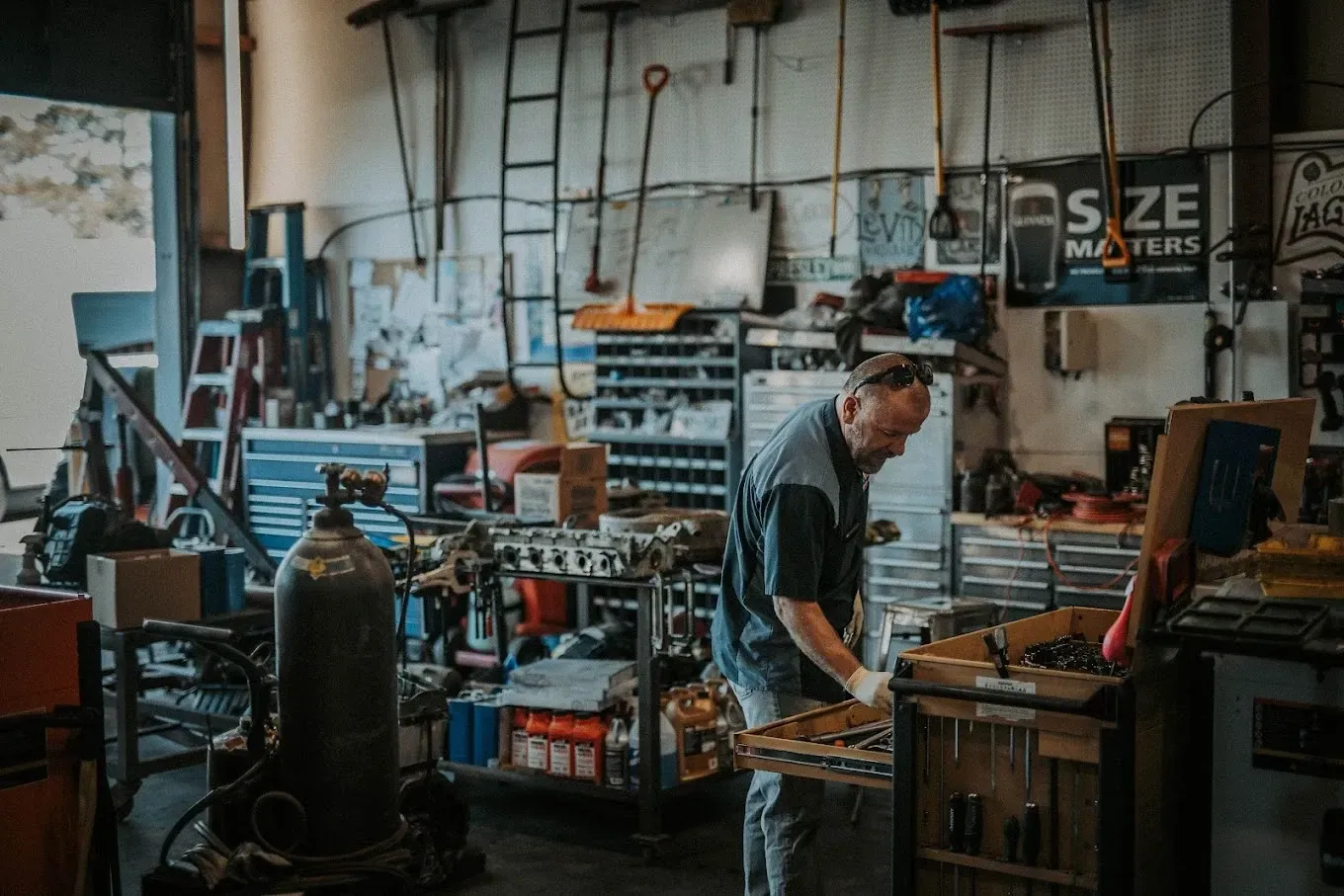
Your battery may be the unsung hero of your vehicle, but it doesn’t last forever. As we head into winter here in Colorado, symptoms of a bad battery can get much worse. Cold weather reduces your battery's ability to hold a charge, and it can also slow down the chemical reactions inside, making it harder to start your engine. If your battery is already weak, the extra strain from freezing temperatures combined with increased power demands like running the heater, defroster, and lights could leave you stranded. Here are some clear signs it’s time for a replacement. 1. Slow Engine Start If your engine cranks slower than normal when you start the car, your battery could be losing power. This is one of the first warnings of a failing battery. 2. Dim or Flickering Lights A weak battery can’t power your vehicle’s electrical systems properly. If your headlights or interior lights dim, it’s a red flag. 3. Dashboard Warning Light Many vehicles have a battery-shaped light that appears when the system detects low voltage. Don’t ignore this—it’s there for a reason. 4. Corrosion on Battery Terminals Check under the hood. If you see white or blue corrosion on the battery terminals, it can interrupt the connection and cause performance issues. 5. Swollen or Leaking Battery A bloated or cracked battery case usually means it’s overheating or has internal damage. This can be dangerous, so get it replaced immediately. 6. Frequent Jump Starts If you’ve needed to jump-start your car more than once in a short time, the battery isn’t holding a charge properly. 7. Strange Electrical Issues Your radio resetting, power windows acting up, or the key fob not working consistently could point to a battery problem. Ready to Replace Your Battery? Most car batteries last around 3 to 5 years. If yours is older and showing any of these signs, don’t wait for it to fail completely. A dead battery at the wrong time can leave you stranded. At Colorado Fleetworks, we know vehicle batteries inside and out. If you’re unsure about yours, we can test it and replace it along with any other winter maintenance your vehicle needs , helping you get back on the road with confidence.
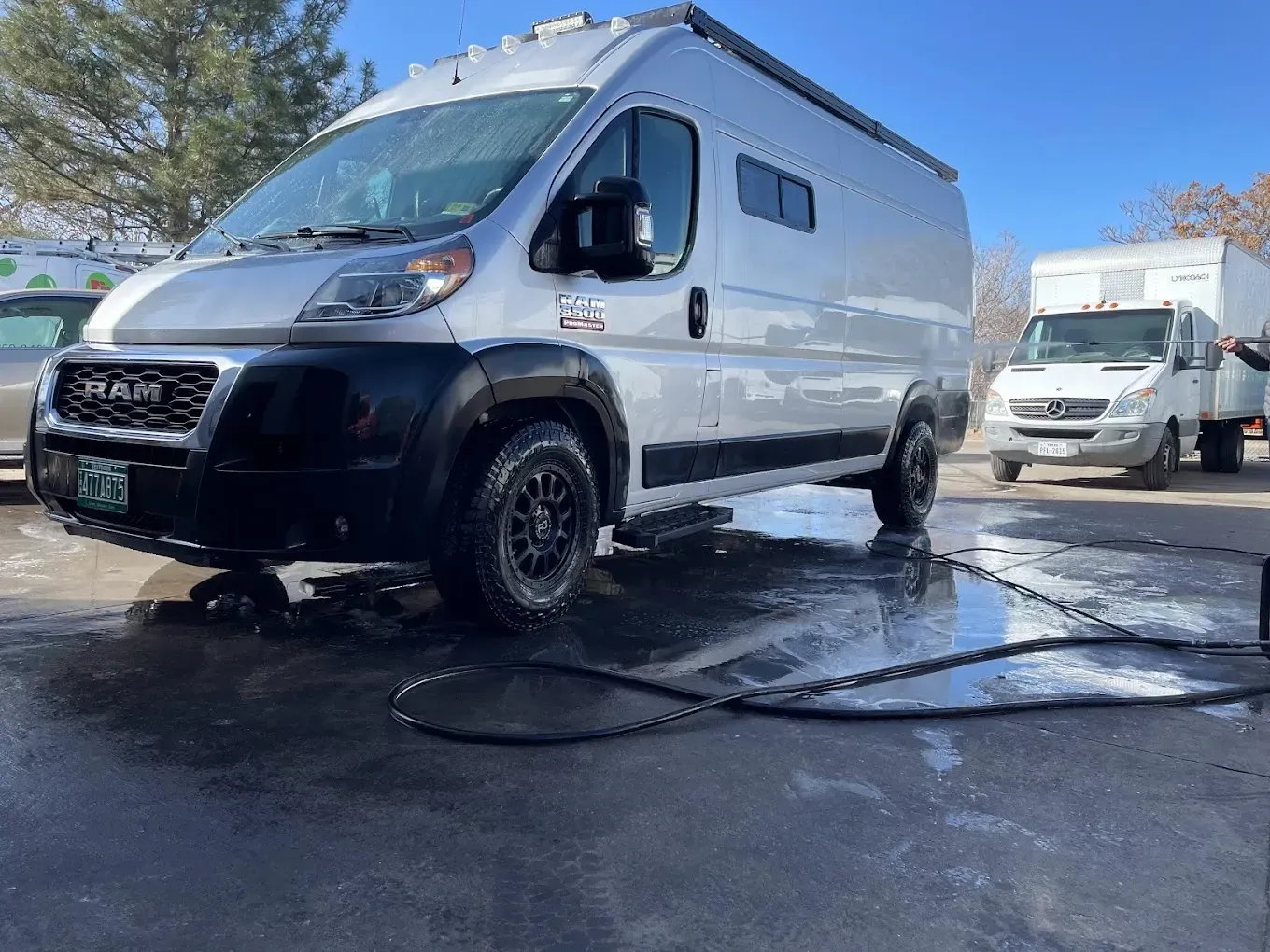
If you’re looking for a van for work, deliveries, or life on the road, reliability is probably your biggest concern. The Ram ProMaster has earned its place as a popular option, offering some real advantages compared to other vans. In fact, the ProMaster is one of our favorite vans to specialize in repairing . How well do they hold up over time? Let’s break it down. Where the ProMaster Stands Out One of the biggest benefits of the Ram ProMaster is its front-wheel drive system. This design gives it better traction on wet or slippery roads and makes the van easier to maneuver in tight spaces. It also allows for a lower floor height, which is a huge plus if you’re loading tools, cargo, or even building out a camper. The ProMaster’s shape is another major win. With its square, straight walls and wide cargo area, you get more usable space than in other vans. Whether you’re installing shelves for work or trying to squeeze in camper van furniture, you’ll appreciate every inch of that boxy design. Compared to vans like the Mercedes Sprinter, ProMasters are also more affordable. They cost less upfront and are cheaper to maintain over time. Parts are easier to find, and repairs tend to be simpler since the ProMaster skips a lot of the premium bells and whistles. The Drawbacks to Be Aware Of No van is perfect, and the ProMaster has a few quirks. Transmission issues can be a problem in older models, especially if maintenance has been overlooked. Electrical systems are another area where trouble can pop up, so keeping an eye on any warning lights is important. The front-wheel drive, while great for city driving, isn’t ideal for rough terrain or off-road conditions. The ProMaster doesn’t have an all-wheel-drive option, which could be a downside if you spend a lot of time in snow or on unpaved roads. How to Keep a ProMaster Running Strong Like any van, reliability depends on how well you take care of it. Regular oil changes , transmission services , and chassis maintenance go a long way toward extending the life of a ProMaster. It’s also worth sticking to a consistent service schedule, especially if you use the van for heavy-duty work or long trips. If you’re using a ProMaster as a camper, be sure that any build-out or modifications don’t interfere with key systems like wiring, brakes, or the transmission. A good van mechanic will know how to work around those setups without causing damage. Are ProMasters Reliable? For most owners, yes. ProMasters are dependable when they’re maintained properly, and they’re an excellent choice for anyone who needs a spacious, practical van that won’t break the bank. They’re ideal for city driving, delivery routes, and budget-friendly camper conversions. If you’re looking for a rugged van that can handle extreme weather or off-road adventures, you might want to look at other options like a Sprinter or Ford Transit. But for everyday use and smart, affordable design, the ProMaster delivers. And if you’re ever in doubt about your van’s reliability, it helps to have a shop that knows what they’re doing. Vans have their own set of unique challenges, and the right mechanic can save you a lot of time, money, and headaches. If you're in the Denver area and needing service or maintenance, give us a call .

If you’ve got a van, whether it’s for work, road trips, or both, at some point you’ll probably need some body work done. But not all body shops are set up to handle the size and needs of a van. At Colorado Fleetworks, we know how important it is to have a body shop that can actually fit your big van in the door , and we’ve got the equipment to make sure the job gets done right. Why You Need a Shop That Can Handle Vans Here’s the thing: a lot of body shops are built for cars and smaller vehicles. Vans, especially ones like Sprinters , RAM ProMasters , or Ford Transits , are way taller and longer. If a shop doesn’t have the right space or equipment, they might struggle to do the work correctly. Or worse, they could damage your van in the process. Vans also have a lot more surface area, so painting and repairs can get tricky if the shop doesn’t have enough room to move around. This is especially true for paint work, which is where many body shops fall short when it comes to larger vehicles. Tall Paint Booths Matter One of the biggest challenges for van owners is finding a body shop with tall enough paint booths. Vans need extra space for the painter to move around and apply an even coat. A shop that doesn’t have tall booths might try to cram your van into a space meant for sedans, and that’s just asking for trouble. At Colorado Fleetworks, we’ve got two of the tallest paint booths in the Denver metro area . That means we can handle even the biggest vans, and we’ve got the room to make sure the paint job is done right. Whether you need a small touch-up or a full repaint, we’re ready to take care of it. Experience With Van Repairs Vans are a different beast when it comes to body repairs. They take more wear and tear, and the larger panels can get banged up pretty easily. Whether it’s dents, rust, or more serious damage, it’s important to have a team that knows how to work on vans specifically. We’ve worked on all kinds of vans, and we know how to get them looking good as new. We’ve got the equipment, the experience, and the space to handle everything from minor dings to full-body repairs. At the end of the day, you want your van to look its best and be in good hands. We’ve invested in the right tools like our tall paint booths to make sure we can handle any job, no matter the size of your van. If you’re in the Denver metro area and need body work, we’ve got you covered. Give us a call or stop by Colorado Fleetworks, and we’ll make sure your van looks as good as it runs.
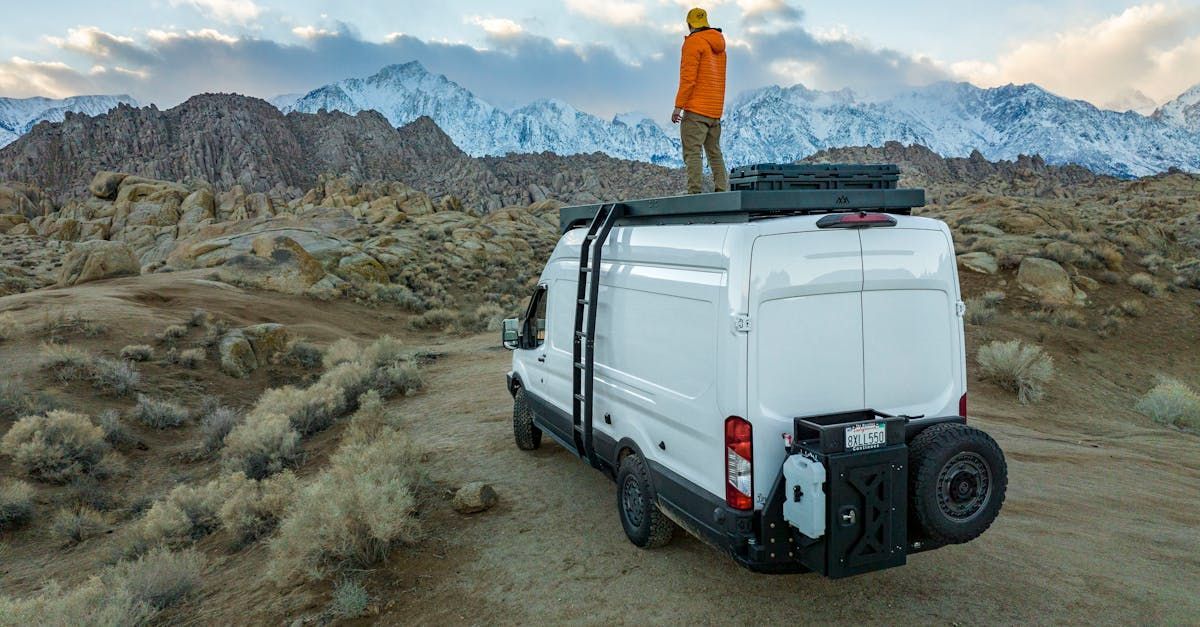
If you rely on your Ford Transit for work or personal use, keeping it in top shape is key to getting the most out of it. These vans are built tough, but like anything, a little care can go a long way. At Colorado Fleetworks, we repair Ford Transits in our Denver shop every week, and we know firsthand that routine maintenance is the best way to keep them running smoothly for years. Here are a few simple tips to help extend the life of your Transit. 1. Stick to Regular Maintenance First things first, always stick to your regular maintenance. Oil changes, filter replacements, and fluid checks should be done on schedule. It’s easy to put these things off, but delaying routine service can lead to much bigger (and more expensive) problems down the road. If you’re not sure what your van needs or when, check the manual or ask us. We're happy to help. 2. Keep an Eye on Your Brakes Brakes are a big deal, especially if you’re using your van to haul heavy loads or doing a lot of city driving. If you hear squeaking or grinding, or if it feels like it’s taking longer to stop, don’t wait. Getting your brakes checked regularly can save you from bigger problems down the line. Plus, replacing brake pads when they’re worn out is a lot cheaper than dealing with damaged rotors. 3. Pay Attention to Your Tires Your tires might not always be top of mind, but they’re critical for both safety and performance. Underinflated tires can mess with your fuel economy, and worn-out tires reduce your grip on the road. Check your tire pressure regularly and keep them inflated to the right level. Also, rotating your tires every 5,000 to 7,000 miles will help them wear evenly which will keep you safer and make them last longer. 4. Don’t Forget Your Transmission Your Transit’s transmission is doing a lot of heavy lifting, especially if you’re using it for towing or carrying big loads. Keep an eye on the transmission fluid and make sure it’s topped off and clean. If you’re noticing any weird noises or issues shifting, it’s time to have it looked at. Transmissions aren’t cheap to fix, but catching problems early can save you a lot of hassle. 5. Take Care of the Cooling System Overheating is no joke, and it can really damage your engine. Make sure your coolant levels are where they should be and replace the coolant according to the manufacturer’s recommendations. If your engine’s running hot or your temperature gauge is creeping up, don’t ignore it. Have a knowledgable Transit mechanic take a look and find the issue. By sticking to these basic tips, you can get a lot more life out of your Ford Transit. Regular maintenance, catching problems early, and keeping things clean all help keep your van in great shape. If you need any help with your Transit, whether it’s routine maintenance or something more serious, give us a shout at Colorado Fleetworks and our expert Transmit mechanics. We’re here to make sure your van stays on the road for the long haul.

If you're trying to decide between a diesel or gasoline van for your business, you're not alone. It’s one of the most common questions we get at Colorado Fleetworks. Both diesel and gas vans have their pros and cons, and what’s best for you depends on how you plan to use your vehicle. After years of working on both types, we’ve learned what works and what doesn’t. Here’s a breakdown to help you make the right choice. 1. Fuel Efficiency Diesel Vans: Diesel engines are known for their fuel efficiency, especially if you’re doing a lot of highway driving or carrying heavy loads. Diesel fuel has more energy per gallon than gasoline, which means you get better mileage. If your van spends most of its time on long trips, diesel might save you money on fuel in the long run. Gas Vans: Gasoline engines burn through fuel a bit faster, especially when you’re dealing with city driving or stop-and-go traffic. However, gas is typically cheaper than diesel, so depending on how much driving you’re doing, the cost difference might not be huge. The Bottom Line : If your business involves a lot of highway miles or heavy cargo, diesel’s fuel efficiency makes a big difference. For lighter loads or city driving, gas will do just fine and might save you a bit at the pump. 2. Maintenance and Durability Diesel Vans: Diesel engines are built tough and can handle high mileage and heavy loads better than gas engines. They tend to last longer, but when repairs are needed, they can be expensive. Parts like turbochargers and fuel injectors aren’t cheap, and diesel engines require specialized maintenance. Gas Vans: Gas engines are generally easier and cheaper to maintain. Repairs are typically less expensive, and there are more mechanics who can work on them. However, gas engines don’t have the same lifespan as diesels. They might need more frequent repairs as they age, especially if they’re put through heavy use. The Bottom Line : Diesel engines last longer and are better for businesses that put a lot of wear and tear on their vehicles. Gas engines are cheaper to maintain but may not go the distance if you’re relying on them for heavy-duty work. 3. Power and Towing Capacity Diesel Vans: Diesel engines produce more torque, which means they can handle towing and heavy loads better than gas engines. If your van is frequently used to haul equipment or tow trailers, a diesel engine will give you the extra power you need without putting too much strain on the engine. Gas Vans: While gas engines have less torque than diesels, they’re still more than capable for lighter loads and regular use. If you’re not towing or carrying extremely heavy cargo, a gas engine will meet your needs just fine. The Bottom Line : If towing capacity and power are critical to your business, go with a diesel. For lighter use, a gas van will get the job done without the extra cost of a diesel engine. 4. Upfront Costs Diesel Vans: Diesel vans tend to cost more upfront. The engines are more expensive to produce, which means you’ll be paying a premium when you buy a diesel vehicle. However, the long-term savings from better fuel efficiency and longer lifespan can balance out that initial investment. Gas Vans: Gasoline vans are usually more affordable to buy. The upfront cost is lower, and for businesses on a budget, that can make a big difference. However, keep in mind that they may not last as long as a diesel engine, so you’ll need to consider the potential for higher long-term costs. The Bottom Line : If your budget allows and you’re looking at long-term savings, diesel might be the better investment. If you’re focused on lower upfront costs, a gas van will save you money from the start. Which is best? When it comes to choosing between a diesel or gas van, it really boils down to how you plan to use your vehicle. Diesel vans offer better fuel efficiency, power, and longevity, making them a great choice for businesses that need to tow or drive long distances regularly. However, they come with a higher upfront cost and more expensive maintenance. On the other hand, gas vans are cheaper to buy and maintain, making them ideal for businesses with lighter needs or a more budget-conscious approach. At Colorado Fleetworks, we’ve got the expertise to help you keep your diesel or gas van running smoothly . Contact us to discuss any repair or maintenance your van needs.
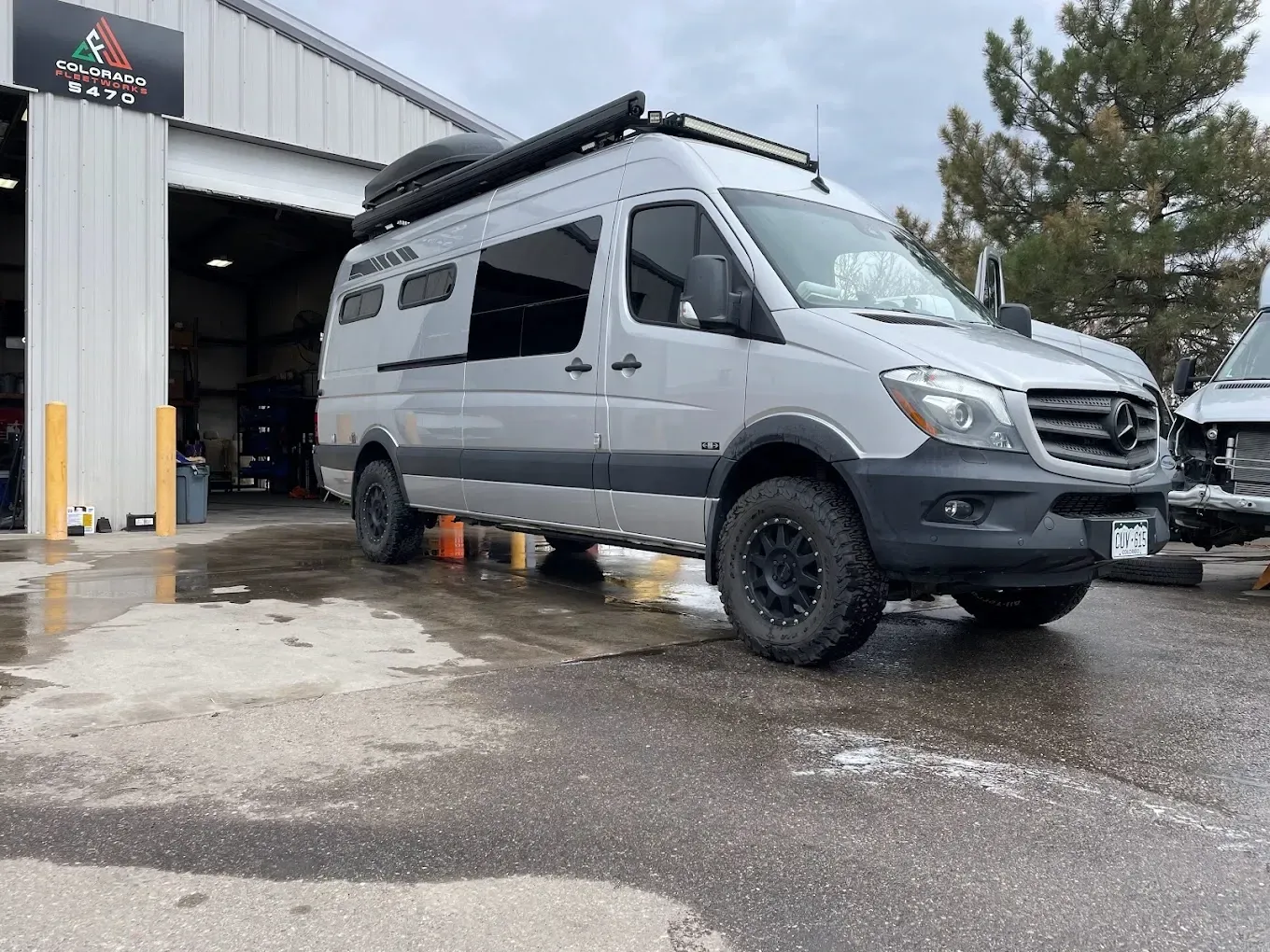
If you drive a van for work or as a camper, it’s important to know that vans aren’t like other vehicles. They have more complex systems and unique challenges that require specialized knowledge. That’s why you need a mechanic who understands vans inside and out. At Colorado Fleetworks, we’ve seen firsthand how important it is to have someone who knows their way around vans for both routine maintenance and serious repairs. Vans are More Complex Than Regular Vehicles Vans aren’t just bigger versions of cars—they're designed for different purposes, like hauling heavy loads or being converted into homes on wheels. Their engines and electrical systems are often packed into tighter spaces, which makes repairs a little trickier. For example, commercial vans like the Mercedes-Benz Sprinter or Ford Transit are built to handle more weight and have more complex systems than your standard car or truck. If you’re not used to working on vans, you could easily miss things. A van expert knows exactly how to get to those hard-to-reach areas without damaging other components and can handle the quirks that come with these larger vehicles. Unique Problems Need Specialized Van Repair Knowledge Vans come with their own set of issues that require specific experience. Many vans, especially workhorses like the Sprinter or ProMaster, run on diesel engines, which need a different approach than gas engines. If your mechanic doesn’t know how to properly service a diesel engine, they could miss or misdiagnose common problems, like turbo or fuel injector issues. Bigger vans also face challenges related to their size, like suspension wear and tear or weight distribution problems, especially if they’re regularly carrying heavy loads. A van expert knows what to look for and can spot these problems early, saving you from bigger repairs down the road. Camper and Work Van Customizations Add Complexity If you’ve got a camper van or a work van with custom shelves, partitions, or other gear, things can get even more complicated. Camper vans often have electrical systems, plumbing, or built-in appliances that need to be worked around carefully. The last thing you want is for someone to damage your solar panel wiring or plumbing while trying to fix your van’s engine. Similarly, work vans often have equipment installed, and it takes a careful hand to work around these setups. A van expert knows how to remove, repair, and reinstall everything correctly without causing more issues. Why a Van Expert Saves You Time and Money Nobody wants to deal with unexpected breakdowns or long repair times, especially when your van is your livelihood or home. A van expert saves you time by diagnosing issues faster and getting the repairs done right the first time. We've seen it all before and know how to handle the specific problems vans face. More importantly, we can spot issues before they become major problems. Regular maintenance with a van expert means catching little things—like wear on your suspension or a transmission issue—before they turn into costly repairs that leave your van stuck in the shop. Vans are complex vehicles with unique needs. Whether it’s a work van or a camper, you want a mechanic who knows how to handle everything from engine repairs to dealing with customizations. At Colorado Fleetworks, we specialize in repairing vans and understand how to keep them running smoothly for the long haul. Don’t trust your van to just any shop—trust a van expert and contact us if you need your van repaired near Denver .

One of the most common questions we get asked at Colorado Fleetworks is, "How long do Sprinter vans really last?" It's a valid concern, especially if you're investing in a vehicle for vanlife or business use. The good news is that Sprinter vans are known for their longevity, but like any vehicle, their lifespan depends on a few key factors. Here's what you need to know about how longer a Sprinter will really last you. Average Lifespan of Sprinters Sprinter vans are built to last. On average, a well-maintained Sprinter can easily hit 300,000 miles, with some even reaching 500,000 miles or more. The key here is regular maintenance. These vans are designed for durability, especially when it comes to long-distance driving and heavy loads. But if you neglect routine service, even the toughest van can run into problems. Importance of Maintenance The secret to a long-lasting Sprinter is simple: keep up with maintenance. Regular oil changes, transmission checks, and timely repairs can significantly extend the life of your van. At Colorado Fleetworks, we've seen Sprinters with over 400,000 miles still running strong because their owners stuck to a solid maintenance schedule. On the flip side, we've also seen vans with far fewer miles that needed major repairs because maintenance was overlooked. Common Mercedes Sprinter Issues to Watch For Even with their reputation for reliability, Sprinters aren’t immune to problems. Common issues include transmission wear, particularly if the van is frequently used for heavy towing or city driving. Rust can also be a concern, especially in older models or if the van is regularly exposed to harsh weather conditions. Addressing these issues early can prevent them from becoming major (and costly) problems down the road. Diesel vs. Gasoline Models Most Sprinter vans come with diesel engines, which are generally more durable and fuel-efficient, contributing to their long lifespan. However, newer models also offer gasoline engines. While diesel engines typically last longer, the choice between diesel and gasoline will depend on your specific needs, including the type of driving you do and your maintenance preferences. How long will they last? So, how long can you expect your Sprinter van to last? If you take care of it, don’t be surprised if it’s still running strong well beyond 300,000 miles. Regular Sprinter maintenance is the key, and at Colorado Fleetworks, we’re here to help keep your van on the road for the long haul. Whether it’s routine service or addressing specific issues, our team has the experience and expertise to keep your Sprinter in top shape. For more tips on maintaining your Sprinter or to learn more about its reliability compared to other vans, check out our previous posts, like the comparison between Sprinter and ProMaster van conversions . And as always, feel free to reach out if you have any questions or need to schedule a service.
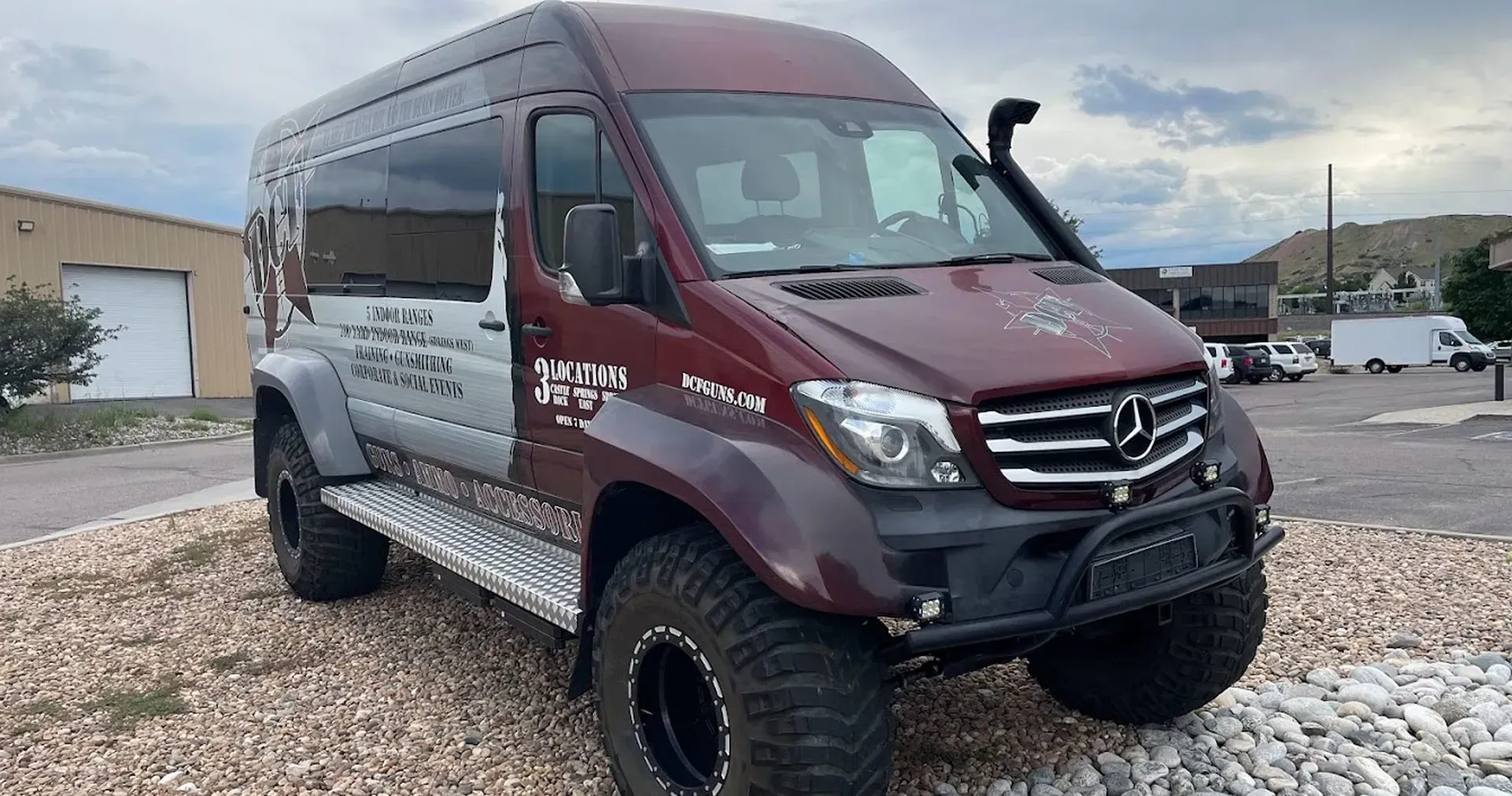
We regularly work on commercial vans and fleet vehicles needing repair and maintenance for Denver businesses. We understand that keeping your commercial van in top shape is crucial for your business. Regular maintenance not only extends the life of your van but also helps avoid costly repairs and downtime. Because your vehicle is probably the lifeblood of your business, here is our advice on how to keep your van running smoothly: 1. Regular Oil Changes and Fluid Checks Oil changes are essential for any vehicle, and your commercial van is no exception. Stick to the manufacturer's recommended oil change intervals to keep the engine running efficiently. Don’t forget to check other fluids like transmission, brake, and coolant levels regularly. 2. Inspect and Rotate Tires Tires take a beating, especially on a work van that’s carrying heavy loads. Regularly check tire pressure, look for signs of wear, and rotate the tires according to the manufacturer’s guidelines. This ensures even wear and prolongs tire life, improving safety and fuel efficiency. 3. Brake Maintenance Your van’s brakes are crucial for safety, especially when it’s fully loaded. Keep an eye out for warning signs like squeaking, grinding, or a soft brake pedal. Regular brake inspections can prevent more serious issues and ensure your van stops when you need it to. 4. Transmission Care Commercial vans often experience heavy use, which can strain the transmission. Regular transmission fluid changes and being mindful of any unusual noises or shifting issues can help prevent expensive repairs down the line. 5. Regular Inspections Schedule regular inspections for your van. A professional mechanic can catch potential issues before they become serious problems. At Colorado Fleetworks, we’ve seen how proactive maintenance can save businesses from unexpected breakdowns and costly repairs. 6. Keep It Clean Don’t overlook the importance of keeping your van clean, both inside and out. Regular washes prevent rust and keep the exterior looking professional. Cleaning the interior, especially if you’re transporting goods or tools, helps maintain a pleasant work environment. 7. Address Issues Early If you notice something off—whether it’s a strange noise, a warning light, or a change in how your van drives—don’t wait. Addressing small issues early can prevent them from turning into major repairs. Maintaining your commercial van is all about consistency. Regular check-ups, timely repairs, and preventive care will keep your van running smoothly for years to come. At Colorado Fleetworks, we’re here to help with everything from fleet maintenance to more complex repairs . Keeping your van on the road is our priority, so don’t hesitate to reach out for any of your service needs.
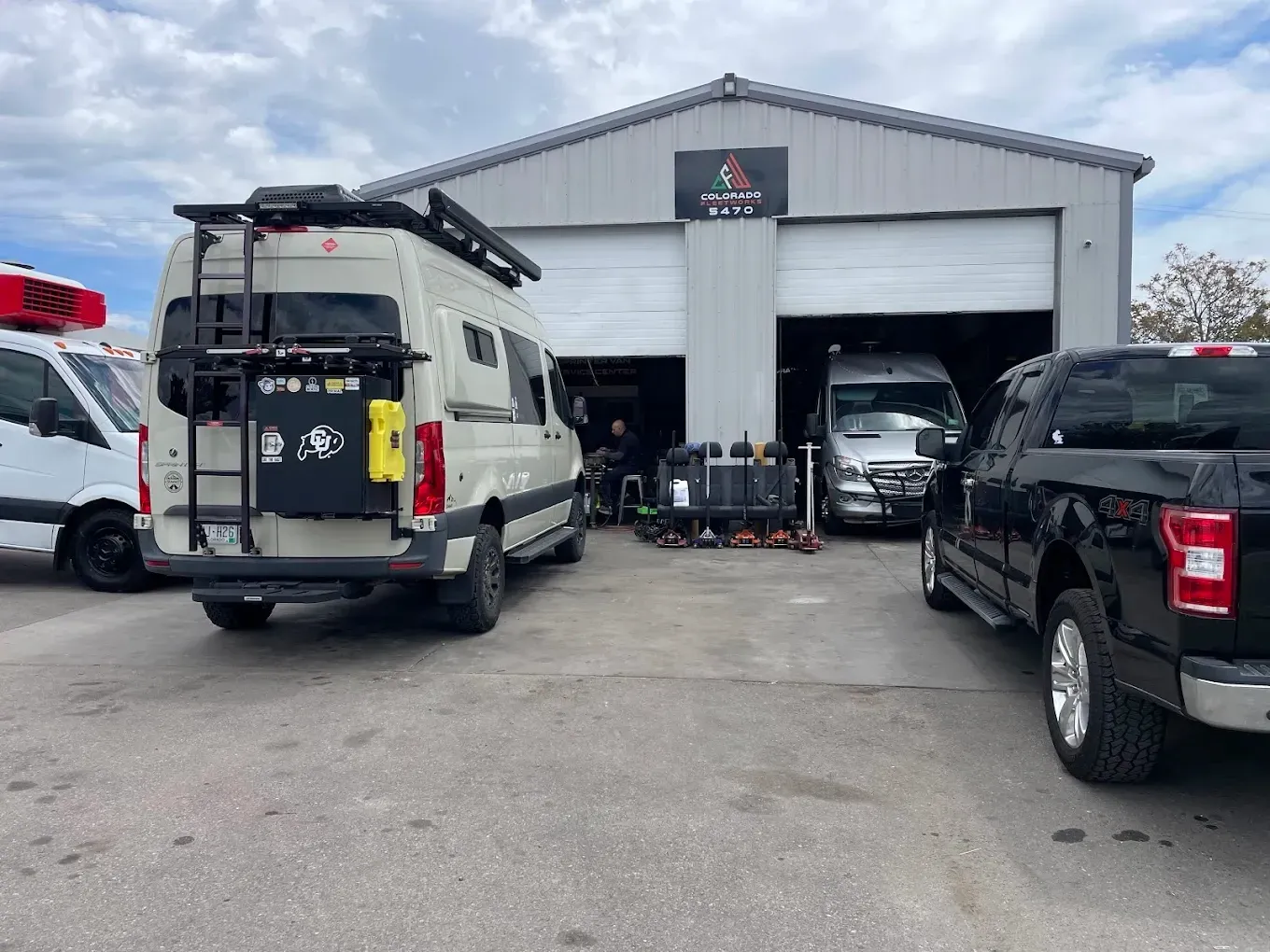
As vanlife continues to gain popularity, choosing a reliable camper van is more important than ever. Whether you're planning weekend getaways or long-term travels, a dependable vehicle can make all the difference. At Colorado Fleetworks, we work on dozens of vans every single week, and have seen firsthand which models stand the test of time. Today, we're comparing three of the most reliable vans for vanlife: the Mercedes-Benz Sprinter, the RAM ProMaster, and the Ford Transit. 1. Mercedes-Benz Sprinter As you know, we really love working on Sprinters . The Mercedes-Benz Sprinter has a solid reputation for reliability, making it a favorite among vanlifers. Known for its robust engine options and superior build quality, the Sprinter is designed to handle anything the road can throw at it, and take you anywhere. Key Features: Durability: Built to last, the Sprinter's high-quality materials and engineering make it a reliable choice for those who want a van that can go the distance. Variety of Roof Heights and Wheelbases: The Sprinter offers multiple configurations with various roof heights and wheelbase lengths, providing ample space for custom camper conversions. 4x4 Option: For those planning to explore off-road destinations, the Sprinter's 4x4 option provides enhanced traction and stability on rough terrain. While the Sprinter is reliable, it's not without its quirks. Transmission issues can arise, especially in older models. Regular maintenance and addressing minor issues early can prevent costly repairs down the line. 2. RAM ProMaster The RAM ProMaster is another popular option for vanlife enthusiasts, known for its practicality and cost-effectiveness. Its front-wheel-drive system and unique design make it a versatile choice. Key Features: Front-Wheel Drive: The ProMaster’s front-wheel-drive setup provides better traction and a lower load floor, making it easier to load and unload gear. Interior Space: The ProMaster boasts a wider rear cargo area than its competitors, which can be a significant advantage when designing your camper layout. Affordability: Generally more affordable than the Sprinter, the ProMaster offers a great balance of cost and functionality. To keep your ProMaster running smoothly, regular check-ups are essential. Pay attention to the transmission and ensure that the drivetrain is in good condition. Routine inspections can help catch issues before they become major problems. 3. Ford Transit The Ford Transit is celebrated for its versatility and ease of customization. It's a reliable option that offers a range of features suited for vanlife. We regularly work on them and you can check out our Ford Transit repair services here . Key Features: Engine Variety: The Transit comes with multiple engine options, including a turbocharged EcoBoost engine, which provides excellent power and fuel efficiency. Drivability: Known for its smooth handling and comfortable ride, the Transit is ideal for both city driving and long highway trips. Customization Potential: With numerous configurations available, including different roof heights and lengths, the Transit can be tailored to meet your specific needs. Like any vehicle, the Transit can have issues, particularly with its turbocharged engines. Regular maintenance, especially oil changes and monitoring the turbo system, can help maintain reliability. Choosing the right van for vanlife depends on your specific needs and budget. The Mercedes-Benz Sprinter offers durability and a range of engine options, making it a great long-term investment. The RAM ProMaster provides practicality and affordability, ideal for budget-conscious adventurers. The Ford Transit stands out for its versatility and customization potential, perfect for those looking to tailor their van to their exact specifications. No matter which van you choose, regular maintenance is key to ensuring its reliability. At Colorado Fleetworks, we're here to help with all your van repair and maintenance needs.
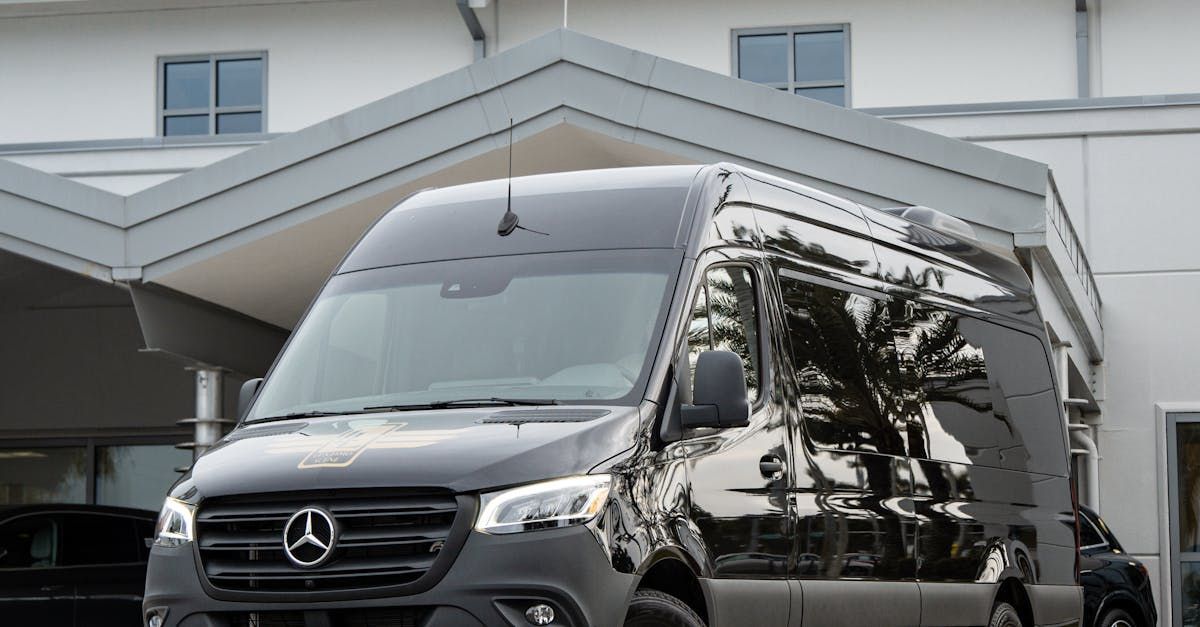
Imagine this: You’re driving along on a beautiful Colorado day, maybe heading up into the mountains or just cruising through town, when you start to notice a whining noise coming from your Sprinter van. It’s subtle at first, but it doesn’t go away. You turn down the radio, trying to pinpoint where the noise is coming from, and you realize - it might be the transmission, maybe it’s the gearbox, or maybe it’s the driveshaft. If you’re hearing a suspicious noise or experiencing other issues, here are some signs to look for that your transmission might need some work, and the types of problems we can help you fix. Here at Colorado Fleetworks, we’ve helped countless Sprinter van owners in this exact situation. We specialize in diagnosing issues that other shops might miss, and our extensive experience repairing Sprinter vans means we can tackle your transmission problem with a proper diagnosis right from the start, to get you back on the road quickly. 1. Unusual Whining Noises One of the first signs that your Sprinter transmission might need attention is unusual noises. If you’re hearing whining, clunking, or humming, it’s time to pay attention. Each type of noise can be a sign of a different issue: Whining could be due to low transmission fluid levels or bad transmission solenoids, or a problem with the transmission pump. Clunking could be a sign of a worn-out transmission mount, or a problem with the drive shaft. Humming might indicate worn-out gears or bearings. If you hear any of these noises, it’s a good idea to get your van checked out sooner rather than later. If you’re in the Denver area, give our shop a call to get your problem diagnosed quickly. 2. Strange Shifting Behavior Another common sign of transmission trouble is difficulty shifting gears. You might notice a delay when going into drive or reverse, jumpy or rough transitions as you drive, or the transmission slipping out of gear while you’re driving. 3. Transmission Fluid Leaks If you notice transmission fluid under your van, that’s a sign there is a leak to fix or repair needed. Transmission fluid is typically reddish in color. Which means if you see red fluid pooling under your van, it’s likely a transmission leak. Leaking fluid can lead to significant transmission damage if it causes you to drive with low fluid. 4. Burning Smells When Driving A burning smell coming from your trusty adventure or work van is never a good sign. If you can smell a burning odor, it could mean your transmission is overheating or the transmission fluid is burning. This can be due to low fluid levels, a clogged filter, or more serious internal damage. If you notice this smell, it’s time to have your van checked to prevent further issues. 5. Poor Performance or Random Surging Transmission problems can also cause sluggish driving performance. You might notice your van is less responsive, has decreased power, or struggles to accelerate. Or, your van might seem to surge randomly. These symptoms can be caused by transmission wear and tear, and ignoring them can lead to more extensive damage. If your van is having any of these symptoms, getting them addressed early can save you a lot of time, money, and hassle in the long run. Taking good care of your Sprinter transmission will prevent major repairs and extend the life of your Sprinter van. At Colorado Fleetworks, we’re dedicated to helping you keep your Sprinter in top shape. Our expertise in diagnosing and repairing Sprinter van transmissions means you can trust us to get the job done right. If you’re experiencing any of these issues, give us a call or stop by our Denver shop . We’re here to help you get back on the road with confidence.

In the last decade, camper vans have become all the rage, and we’ve all seen Youtubers and Instagrammers living the dream from their camper vans all over the US. So you might be thinking of converting a van yourself - and you’re probably trying to decide between a Mercedes-Benz Sprinter and a RAM ProMaster. Which is better for a camper van conversion - Sprinter vs Promaster? It depends on your priorities and your budget. We have worked on plenty of both here at Colorado Fleetworks, and will help you weigh your options. Both a Sprinter and a Dodge Ram van are solid choices, but they have some key differences. Performance and Handling First up, let’s talk about how these vans perform on the road. Both vans are capable, but to different degrees. Sprinter Vans: The Sprinter is known for its powerful engine options. Most Sprinters have a diesel engine, which provides plenty of torque for those mountain drives and gets great MPG. Plus, if you plan on hitting off-road trails, the 4x4 option is a big advantage. You can tackle a huge variety of terrains in a Sprinter and you’ll almost never get stuck on the beach or in the mountains. RAM ProMasters: On the other hand, the ProMaster has a front-wheel-drive system and a lower floor. This makes it easier to handle and might be easier to load and unload your gear. While it does offer a diesel option we would not recommend that because we have seen so many bad issues that we don’t feel like it is an option we would want our customers to have. The gasoline engine is reliable and gets the job done efficiently. Interior and Layout When it comes to converting a van into a camper, space is everything. It dictates how you’ll lay out your living quarters and how complex the build process will be. Sprinter Vans: The Sprinter offers a variety of configurations with different roof heights and wheelbase lengths. The high-roof option is particularly useful if you want that extra vertical space, making it easier to move around inside. However if you want to put a bed in the back, most van builders have to add fiberglass bumpouts, as the stock body is too narrow to put a bed in horizontally. RAM ProMasters: The ProMaster might not have as many body styles as the Sprinter, but it has a trick up its sleeve - a wider cargo area. This extra width between the wheel wells can make a big difference when you’re trying to fit in wider items or want to put your mattress across the back without cutting into the body. The boxy shape also makes it easier to customize the interior. Cost and Value Budget is usually a top factor if you’re considering buying a van or doing a custom camper van build. Sprinter Vans: The Sprinter tends to have a higher upfront cost. However, they also tend to have a longer lifespan and higher resale value. If you’re planning to use your camper van frequently and want a 4x4 van that will last for hundreds of thousands of miles, a diesel Sprinter is a solid choice. RAM ProMasters: The ProMaster is generally more affordable, making it a great option if you’re on a budget. It might not have all the bells and whistles of the Sprinter, but they’re reliable and functional. If you want to get started with van life without breaking the bank, the ProMaster is a practical and more affordable option. In the end, choosing between these van options depends on your specific needs and budget. The Sprinter is a favorite among professional van builders and offers better offroad performance and longevity, making it ideal for full-time travelers and off-road enthusiasts. The ProMaster is more affordable and has a body that lends itself to slightly more straightforward campervan builds, but has less aggressive offroad capabilities, making it perfect for everyday adventures and DIY enthusiast on a budget. Once you’re on the road, we can help with all of your van repair needs, whether you choose a Ram or Sprinter . We specialize in big van repairs, so if you ever need maintenance or have a breakdown in the Denver area when you’re out on an adventure, we’re your shop.


